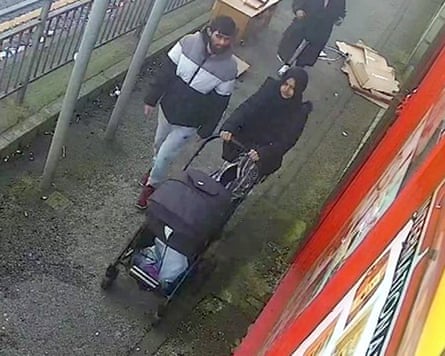On a quiet spring day in Bradford, West Yorkshire, a young woman named Kulsuma Akter was doing something simple and everyday—pushing her baby son in a pram alongside a trusted friend. To most people, it might have looked like a normal afternoon. But behind that ordinary moment was an extraordinary story of courage, survival, and ultimately, tragedy that shook an entire community.
Kulsuma had left her home months earlier, seeking refuge from a relationship that had become defined by fear, control, and relentless pressure. Like many women who make the difficult decision to escape abusive partners, she hoped the move would give her and her baby a chance at safety, peace, and a future free from constant surveillance.
What no one could have imagined was how determined her husband, Habibur Masum, would be in trying to track her down—and how his actions would leave lasting scars not only on her family but also on the wider community.

Habibur Masum followed his wife to a refuge in Bradford where she had been staying to escape him after he held a knife to her throat. Photograph: West Yorkshire police/PA
In court, prosecutors described the couple’s relationship as one built on jealousy and coercion. Kulsuma’s friends and social workers later confirmed that she had long felt her husband was capable of harming her. She once confided that she feared “one day he might kill me.” These chilling words were not simply fear—they reflected the reality she lived in.
Masum’s behaviors, jurors were told, ranged from threats to physical intimidation. At one point, he was placed under strict bail conditions that ordered him to stay away from his wife. But despite these measures, the cycle of stalking and harassment continued. In the days leading up to the final confrontation, Masum was seen on CCTV repeatedly circling the area around the women’s refuge where his wife was staying. He even went as far as impersonating staff from a local GP surgery, calling with fake appointments in an attempt to lure her out.
The evidence painted a disturbing picture of a man unwilling to let go, determined to assert control no matter the cost.

On April 6, 2024, Kulsuma thought she was safe. She was accompanied by her baby son and a close friend, believing that her husband was far away in Spain. But Masum had been watching and waiting. CCTV later captured him approaching her, walking beside her calmly, almost as if nothing was wrong.
What followed, witnesses described, was a confrontation that ended in unimaginable heartbreak. Out of nowhere, Masum’s demeanor changed. In a moment of shocking escalation, he launched into an attack that would claim Kulsuma’s life—right there on the street, with her infant son present.
The courtroom would later hear how he disposed of the weapon and then walked through Bradford city centre with chilling calmness. Cameras caught him boarding a bus, even smiling as he believed he had escaped.

CCTV of Habibur Masum walking with his wife in Bradford. Photograph: West Yorkshire police/PA
For four long days after the attack, police forces across the UK coordinated one of the most intense manhunts in recent memory. With public appeals, CCTV footage, and community support, authorities pieced together Masum’s movements. He had traveled nearly 150 miles, ending up in Aylesbury, Buckinghamshire.
When police finally closed in, he was taken into custody without resistance. Yet even in custody, Masum denied responsibility. He admitted to lesser charges but claimed he had “lost control” and had never planned to end his wife’s life.
The trial, however, told another story—one of premeditation, repeated stalking, and a calculated plan to trap and confront Kulsuma.

In Bradford Crown Court, jurors listened to weeks of evidence: CCTV clips, witness statements, and Masum’s own testimony through an interpreter. The prosecutor, Steve Wood KC, described the relationship as “an abusive relationship characterized by jealousy and control.” He emphasized that Kulsuma had taken every possible step to protect herself—yet her husband still found her.
When the verdict came, it was unanimous: guilty of murder. Masum was also convicted of assault, making threats, and stalking. For Kulsuma’s family, the decision brought a measure of justice, though nothing could erase the loss of a daughter, sister, and mother.
Detective Chief Inspector Stacey Atkinson summarized the sentiment of many when she said: “Kulsuma suffered a brutal attack in broad daylight whilst her baby son was in his pram. Masum carried out the act, then calmly walked away as if nothing had happened. He believed he could escape justice, but he was wrong.”

A forensics officer is seen exiting the front of the property (Picture: Steve Reigate for Daily Mail)
Kulsuma was more than a victim of abuse. She was a young mother who had dreams of building a safe, happy life for her son. Friends described her as resilient, soft-spoken, and fiercely protective of her child. Her decision to leave her husband was an act of strength, not weakness—a step countless women struggle to take.
Her story is now part of a larger conversation: how can communities, authorities, and social systems better protect those escaping abusive relationships? For many advocates, the case underlines the importance of safeguarding measures, monitoring abusers more effectively, and providing more resources to women’s refuges.

Police still examining the scene in Bradford on Saturday evening (Picture: YappApp)
This case is not just about one family—it’s about the warning signs society must not ignore. When a partner uses tracking, impersonation, threats, or intimidation, these are not isolated events. They are part of a dangerous escalation that requires serious intervention.
Communities can play a role, too. Neighbors, friends, and even employers are often the first to notice when someone seems trapped in a controlling relationship. Knowing how to respond—offering support, encouraging victims to speak to professionals, and reporting concerning behaviors—can be life-changing.
For legal authorities, this case highlights the importance of enforcing restraining orders and bail conditions with vigilance. Each breach must be taken seriously, because in too many cases, it signals further risk.

Habibur Masum in a picture posted to social media (Picture: Threads/@___m_a_s_u_m___)
Kulsuma’s family continues to grieve, but her story has already sparked discussions in parliament, community organizations, and among domestic violence charities. The aim is clear: to prevent another tragedy by learning from the failures that left her vulnerable.
In a society that values freedom and safety, no one should have to live in fear of a controlling partner. Kulsuma’s courage in leaving, her attempt to build a new life, and the resilience of her loved ones who continue to speak out, remind us of the stakes at hand.
Justice has been served in court. But true justice will come only when systems change enough to ensure that stories like Kulsuma’s are never repeated.

A police cordon in place on the street in Bradford (Picture: Newsquest / SWNS)
The story of Kulsuma Akter is a heartbreaking reminder of the devastating consequences of coercive control and stalking. It is also a call to action. Every statistic about domestic abuse represents a real person—someone with hopes, dreams, and loved ones. By listening, believing, and supporting victims, society can make strides toward ending cycles of fear and violence.
For readers, the takeaway is clear: never dismiss the early signs of coercive behavior. Jealousy, possessiveness, and control are not “love.” They are warning signs. Recognizing them, and helping those at risk, is part of building safer communities for everyone.



